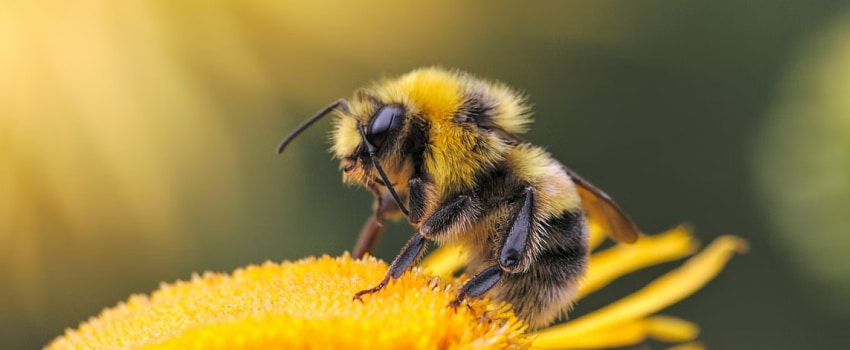
Bee’s in the UK are being given a helping hand with the creation of hundreds of miles of bee highways. The action comes as we face a dramatic decline in the bee population.
No Mow May
Across the UK people are being encouraged to not cut the grass in their gardens for the month of May.
In the UK, we have 100’s of species of bee, as well as thousands of other pollinating insects such as butterflies, and moths. However, there is a risk that up to 40% of them are at risk of extinction.
Pollinators help in the production of food we eat, the flowers we enjoy and are key to the biodiversity of the planet. Pollinators transfer pollen between plants, which assist in crops and fruit growing and therefore food production.
The decline in the bee population is therefore very worrying. The drop in numbers is due to habitat loss. Wildflower meadows are being lost in favour of crop farming and urbanisation, and the bees need the wildflowers for food.
B-Lines project
A new project aims to connect existing wildflower areas together. The B-Lines project will help bees and other pollinators navigate between urban and crop areas and locate other wildflower meadows within easy distance. The idea is that bees will have to travel less distance between meadows for their food.
The project used maps to locate existing wildflower areas and see where there was a lack. The project then aims to connect the existing wildflower areas by creating and restoring wildflower patches in the barren locations.
Wildflower seeds a planted and growth is encouraged by restricting mowing. By reducing the distance between wildflower patches we reduce the distance the bees need to travel. They have limited flight capacity to find food so patches need to be close together.
Councils involved
Councils are getting involved in the project by encouraging no mowing in May and distributing free wildflower seeds. The wildflower meadows are also being sown in parks and alongside roads.
The project has already restored and created 1500 hectares of wildflower habitat around the UK. However the goal of the project is to create 150,000 new wildflower areas. When a new area is created it is added to the B-Lines map so as to track progress of the project. The map is publicly available so you can check where the nearest wildflower patch is.
Habitat creation
Wildflower meadows are not just beneficial to bees and other pollinators. They also provide habitats for thousands of insects, birds, small mammals and plants. They should also be a positive step in the battle against climate change. Warmer weather patterns mean bees can fly shorter distance and therefore the need for greater connectivity between wildflower meadows and habitats is crucial.
There are a few downside risks too in creating wildflower rich areas. If we create habitats that are a highly concentrated source of food and habitat then they could become overcrowded by pollinators and disease could spread. The project organisers are keen to monitor this issue but currently it is unknown if that will be a serious issue.
The risk of disease is not so great that we should not carry on with the project. The creation of bee highways around the UK is a step in the right direction to tackling the insect population decline. The huge benefits outweigh the downside risk.
If you would like to find out more about the B-Lines project then head to the buglife site.





